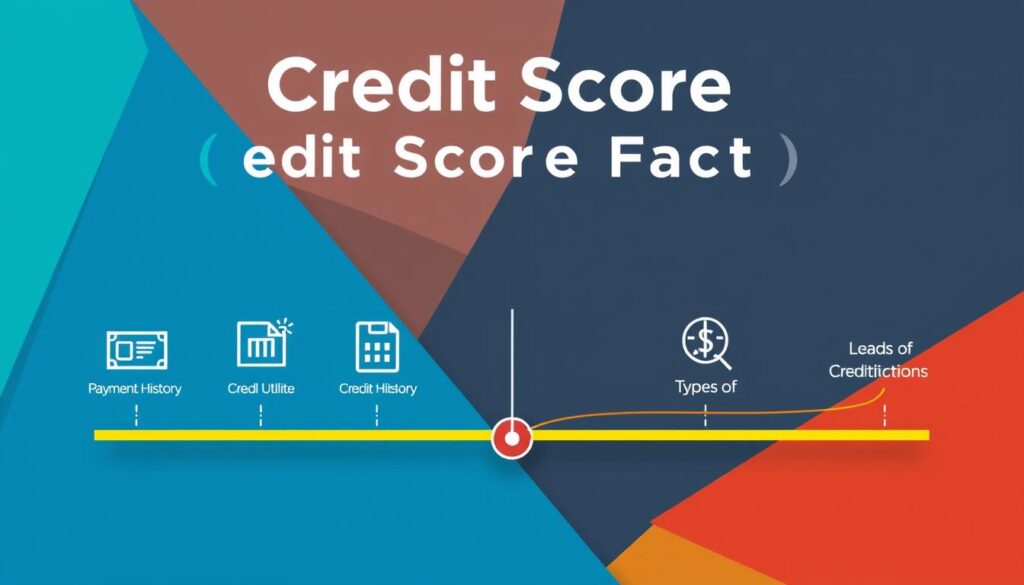A credit score of 720 or higher can unlock better financial opportunities. It can lead to lower interest rates on loans and increased credit limits. This guide offers proven strategies to boost your credit rating and improve your FICO score.
Key Takeaways
- Optimize your payment history to build a strong credit foundation
- Lower your credit utilization ratio to demonstrate responsible credit management
- Resolve delinquencies and negative marks on your credit report effectively
- Diversify your credit portfolio to improve your credit mix
- Leverage credit monitoring and identity protection services to maintain good credit health
Understanding Credit Scores and Their Importance
Your credit score shows how trustworthy you are with money. This three-digit number is based on your credit history and payment habits. It affects your ability to get loans and better interest rates.
Your score can also impact job and housing opportunities. A good credit score opens doors to better financial options.
What is a Credit Score?
A credit score ranges from 300 to 850. Higher scores mean lower credit risk. Lenders use this to judge if you’ll pay back debts on time.
The most common model is the FICO score. It looks at payment history, credit use, and credit types.
Why is a Good Credit Score Crucial?
A high credit score can save you thousands on loans and mortgages. It gives you access to better interest rates.
Landlords and employers may check your credit report. They use it to see if you’re reliable. Insurance companies might look at it too.
| Credit Score Range | Interpretation |
|---|---|
| 800-850 | Excellent credit |
| 740-799 | Good credit |
| 670-739 | Fair credit |
| 580-669 | Poor credit |
| 500-579 | Very poor credit |
A good credit score is key to financial stability. It helps you get better credit terms and opportunities.
By keeping a healthy credit profile, you set yourself up for success. It can improve many parts of your life.
Factors That Influence Your Credit Score
A healthy credit score is key for good loan terms and job opportunities. Your payment history is the most important factor. It makes up 35% of your credit score.
Payment History: The Most Significant Factor
Payment history shows how well you pay your bills on time. It covers credit cards, loans, and other money you owe. Good payment habits show lenders you’re responsible.
This can lead to better interest rates and credit terms. Timely payments are crucial for a strong credit score.
Late or missed payments can hurt your credit score factors. One missed payment can lower your score by 100 points. The payment history impact can last up to seven years on your report.
- Paying all your bills on time is the single most important factor in maintaining a strong credit score.
- Even a single late payment can have a significant and lasting negative effect on your credit score factors.
- Developing a consistent, responsible payment history is key to building and maintaining an excellent credit score.
| Credit Score Factor | Percentage of Total Score |
|---|---|
| Payment History | 35% |
| Credit Utilization | 30% |
| Length of Credit History | 15% |
| Credit Mix | 10% |
| New Credit | 10% |

“Paying your bills on time is the single most important factor in building and maintaining a good credit score.”
Strategies to Improve Your Credit Score
Boosting your credit score is key to financial stability and new opportunities. Two powerful ways to do this are consistent payments and lower credit use.
Maintain a Consistent Payment History
Payment history affects 35% of your credit score. It’s the most important factor. Always pay your credit cards and loans on time.
Even one late payment can hurt your score badly. Make timely payments your top priority.
Lower Your Credit Utilization Ratio
Your credit use affects 30% of your score. It’s how much credit you use compared to what’s available.
Keep your credit card balances low. Try to use less than 30% of your available credit.
| Strategy | Impact on Credit Score |
|---|---|
| Maintain a Consistent Payment History | Up to 35% of your credit score |
| Lower Your Credit Utilization Ratio | Up to 30% of your credit score |
These two strategies can greatly improve your credit score. They open doors to better financial chances.
Building good credit takes time and effort. But the rewards are worth it.
“Consistent, responsible credit behavior is the foundation for a healthy credit score.”
The Art of Credit Repair
Boosting your credit score is achievable with the right strategies. Credit repair is a powerful way to enhance your creditworthiness. Let’s explore techniques to address negative items and improve your credit score.
Start by understanding your current credit profile. Review reports from Experian, Equifax, and TransUnion. Look for inaccuracies, errors, or negative items affecting your score.
Once you have a clear picture, begin addressing these issues. Dispute any errors you find on your credit reports.
- Dispute Inaccuracies: Challenge errors like incorrect late payments or unfamiliar accounts. Provide evidence to support your claims when disputing items with credit bureaus.
- Negotiate with Creditors: For valid negative items, talk to your creditors. Try to work out payment plans or request goodwill adjustments.
- Utilize Credit Counseling Services: Seek help from reputable credit counseling agencies. They can guide you through repair strategies and help negotiate with creditors.
The credit repair process requires time and patience. Stay persistent in your efforts to improve your credit score.
With dedication, you can enhance your financial opportunities. Keep working towards your credit goals for a brighter financial future.

“With the right strategies, anyone can take control of their credit and improve their financial future.”
Dealing with Delinquencies and Negative Marks
A healthy credit score is vital for financial well-being. Delinquencies and negative marks on your credit report can hurt it. Let’s explore ways to tackle these issues and improve your credit profile.
How to Remove Inaccurate Information
Errors on credit reports are common. Review your report carefully for any inaccuracies. Look for delinquencies or negative marks that don’t belong.
If you find errors, take action. Dispute them with credit bureaus and provide supporting documents. Follow up until the credit report errors are fixed. Check that corrections appear on your report.
- Dispute the errors with the credit bureaus by providing supporting documentation.
- Follow up diligently until the credit report errors are resolved.
- Ensure that the corrected information is accurately reflected on your credit report.
Strategies for Resolving Late Payments
Late payments can harm your credit score. However, there are ways to lessen the impact. Consider these strategies:
- Negotiate with creditors to have late payments removed from your credit report, especially if you have a history of on-time payments.
- Explore options for “pay-for-delete” agreements, where creditors agree to remove the negative item in exchange for full payment.
- Implement a plan to ensure timely payments going forward, such as setting up automatic bill pay or calendar reminders.
Be persistent when dealing with delinquencies and negative marks. Address issues directly to rebuild your credit profile. This can open new financial doors for you.
Credit Mix: Diversifying Your Credit Portfolio
A strong credit profile is vital for your financial health. Credit mix is a key part of this. It includes various credit types in your report, like cards, loans, and mortgages.
Diversifying your credit can boost your score. It can also open doors to better financial options.
The Benefits of Different Credit Types
A mix of credit types can positively impact your credit score. Different credit types offer unique benefits to your credit profile.
- Credit Cards – Responsible usage of credit cards, including keeping your credit utilization low, can demonstrate your ability to manage revolving credit.
- Installment Loans – Loans like auto loans, student loans, or personal loans that require fixed monthly payments can show lenders that you can handle different types of credit.
- Mortgages – Obtaining a mortgage and making timely payments can be a significant factor in building a strong credit history and demonstrating your creditworthiness.
Using various credit types shows your credit diversification and credit mix. This can boost your overall credit types and score.
| Credit Type | Impact on Credit Score |
|---|---|
| Credit Cards | Demonstrates ability to manage revolving credit |
| Installment Loans | Shows you can handle different types of credit |
| Mortgages | Builds a strong credit history and creditworthiness |
A diverse credit mix shows your financial responsibility. It can lead to better interest rates and higher credit limits.
Increase Credit Score 720+
A credit score of 720 or above unlocks better financial opportunities. It leads to lower interest rates and improved loan terms. You can use several strategies to boost your credit score above 720.
Consistent payment history is crucial for credit score optimization. Pay all bills on time, every time. Set up automatic payments or reminders to avoid missing due dates.
Regularly check your credit report for errors. Address any inaccuracies promptly to maintain a healthy score.
- Make on-time payments consistently to build a positive payment history.
- Utilize automatic payments or payment reminders to avoid late or missed payments.
- Monitor your credit report regularly to identify and address any errors or inaccuracies.
Keep your credit utilization ratio low. This ratio compares your used credit to your total available credit. Aim to keep it below 30% for a healthy credit score.
- Request credit limit increases from your card issuers to expand your available credit.
- Pay down your balances to keep your credit utilization ratio low.
- Avoid maxing out your credit cards, as this can negatively impact your score.
These proven techniques can help you increase your credit score 720+. Stay committed to maintaining healthy credit habits. Remember, optimizing your credit score is an ongoing process.
“The key to a 720+ credit score is discipline, consistency, and a deep understanding of the factors that influence your creditworthiness.”
| Factors | Impact on Credit Score |
|---|---|
| Payment History | 35% |
| Credit Utilization Ratio | 30% |
| Length of Credit History | 15% |
| Credit Mix | 10% |
| New Credit Inquiries | 10% |
Credit Monitoring and Identity Protection
A healthy credit score is vital for financial well-being. Regular credit report checks and identity protection are key. Credit monitoring helps spot errors or fraud that could harm your credit score.
Quick action on these issues protects your financial health. By staying vigilant, you can maintain control over your credit profile.
The Importance of Regular Credit Checks
Check your credit report at least once a year. This helps catch problems early. Identity protection services offer real-time alerts and support.
These tools give you peace of mind. They help you act fast if there’s a security breach.
- Regularly review your credit report for accuracy and potential fraudulent activities
- Utilize credit monitoring services to stay informed of any changes to your credit profile
- Implement robust identity protection measures to safeguard your personal information
Prioritize credit monitoring and identity protection. This helps secure your financial future. It also keeps your hard-earned credit score safe.

“Protecting your identity and monitoring your credit reports are essential steps in maintaining a healthy financial life.”
| Benefit | Description |
|---|---|
| Early Fraud Detection | Regular credit report reviews and identity protection services help you quickly identify and address any suspicious activities, limiting the potential damage to your credit. |
| Improved Credit Score Management | By staying informed about your credit profile, you can make more informed financial decisions and take proactive steps to maintain or improve your credit score. |
| Increased Financial Security | Implementing comprehensive credit monitoring and identity protection measures provides a valuable safeguard against identity theft and other financial crimes. |
Credit Counseling Services: A Helping Hand
Credit counseling services offer valuable support for improving your credit score. They provide personalized guidance for those facing credit challenges. These organizations offer credit counseling and debt management strategies to help achieve credit score improvement goals.
Credit counseling services excel in debt management expertise. They create custom plans to tackle debts and negotiate with creditors. These professionals help develop realistic budgets aligned with your financial situation.
They can consolidate payments and negotiate lower interest rates. This assists in paying off debts more efficiently. Credit counseling services also offer comprehensive credit education.
They explain factors influencing your credit score, like payment history and credit utilization. Understanding these elements helps you make informed decisions to improve your credit score.
Credit counselors provide ongoing support throughout the improvement process. They identify concerns, develop step-by-step plans, and monitor progress. This ensures you stay on track to reach your financial goals.
“Working with a credit counseling service was a game-changer for me. They not only helped me manage my debts but also empowered me with the knowledge to make better financial decisions moving forward.” – Sarah, a satisfied client
Consider contacting a reputable credit counseling service to boost your credit score. Their expertise and personalized approach can guide you towards better financial health. Take steps to improve your credit and create a brighter financial future.
Building and Maintaining Good Credit Habits
A strong credit profile is key to financial stability and opportunities. Good credit habits are essential for this. These habits include responsible borrowing and spending practices and proactive credit management.
They can significantly improve your credit score and financial well-being. Developing these habits can lead to a brighter financial future.
Responsible Borrowing and Spending Practices
Borrowing and spending practices are crucial for good credit. Create a budget, limit credit utilization, and pay bills on time. These actions show lenders you manage credit well.
Disciplined spending and borrowing can boost your creditworthiness. It opens doors to better financial opportunities in the future.
- Develop a detailed budget to track your income and expenses, ensuring you live within your means.
- Maintain a low credit utilization ratio, which is the amount of credit you’re using compared to your total available credit limit.
- Make all your payments on time, including credit card bills, loans, and other financial commitments.
These responsible credit habits can greatly improve your credit score. They can also help you access better financing options later on.
| Habit | Description | Impact on Credit Score |
|---|---|---|
| Budgeting | Creating a detailed budget to manage income and expenses | Helps maintain low credit utilization and on-time payments |
| Limiting Credit Utilization | Keeping credit card balances low compared to available limits | Reduces credit utilization ratio, a significant factor in credit scoring models |
| Timely Payments | Making all payments, including credit cards and loans, on or before the due date | Payment history is the most influential factor in determining credit scores |
Good credit habits set you up for financial success. They unlock opportunities that come with a strong credit profile.
By consistently practicing these habits, you’ll be on your way to a healthier financial future.

Resolving Credit Disputes Effectively
Inaccuracies on your credit report can be frustrating. However, it’s crucial to address them quickly. Credit disputes help maintain a healthy credit profile and ensure accurate financial information.
Step-by-Step Guide to Filing Disputes
Resolving credit report errors requires a systematic approach. Follow this guide to file a dispute resolution effectively:
- Obtain a copy of your credit report from all three major credit bureaus: Experian, Equifax, and TransUnion.
- Carefully review your credit report and identify any inaccuracies, such as incorrect account information, late payments, or fraudulent activities.
- Gather supporting documentation, such as payment receipts, correspondence with creditors, or identification documents, to substantiate your claim.
- Contact the credit bureaus directly, either by mail, online, or by phone, and submit a formal dispute for each item you wish to have corrected.
- Follow up regularly with the credit bureaus to ensure your dispute is being processed and to track the progress of the investigation.
- If the credit bureaus do not resolve the issue to your satisfaction, you may need to escalate the dispute by contacting the creditor directly or seeking assistance from a consumer rights organization.
Addressing credit disputes takes time but protects your financial future. Follow these steps to take control. Ensure your credit score reflects your true creditworthiness.
| Credit Bureau | Dispute Resolution Process | Average Resolution Time |
|---|---|---|
| Experian | Online, by mail, or by phone | 30-45 days |
| Equifax | Online, by mail, or by phone | 30-45 days |
| TransUnion | Online, by mail, or by phone | 30-45 days |
Persistence is key for effective credit dispute resolution. Be thorough and keep good records. These actions ensure an accurate credit report and a stronger financial future.
The Impact of Credit Scores on Major Life Events
Your credit score is a powerful tool. It can open or close doors in major life events. From mortgages to rentals, it affects your financial opportunities.
A strong credit score of 720 or above unlocks possibilities. Homebuyers with excellent credit may qualify for lower mortgage rates. This can lead to substantial savings over time.
Landlords often prefer tenants with high credit scores. It ensures a reliable rental history. It also reduces the risk of defaulted payments.
| Life Event | Credit Score Impact |
|---|---|
| Buying a Home | Higher credit scores can secure lower interest rates and better loan terms |
| Renting an Apartment | Landlords often favor tenants with strong credit profiles |
| Obtaining an Auto Loan | Better credit means lower interest rates and more favorable loan conditions |
| Finding Employment | Some employers may check credit history as part of the hiring process |
A high credit score can impact your job search. Some employers, especially in finance, may check credit history. They see it as a sign of financial responsibility.
“Maintaining a good credit score is not just about getting approved for credit – it’s about unlocking the financial opportunities that can transform your life.”
Your credit score is a key to financial success. It influences major life events. By building a strong credit profile, you can boost your financial stability.
Advanced Strategies for Credit Score Optimization
Consistent payments and low credit utilization are key. But there are more ways to boost your credit score. One such method is credit piggybacking.
Leveraging Credit Piggybacking Techniques
Credit piggybacking lets you benefit from someone else’s good credit history. You become an authorized user on their credit card account. This can help increase your credit score.
Family members or close friends with solid credit are ideal for this strategy. Their positive credit history can boost your own profile. This can lead to better credit terms for you.
Credit-building services also offer piggybacking opportunities. They connect you with people who have excellent credit histories. This approach is especially helpful for those with limited or poor credit.

